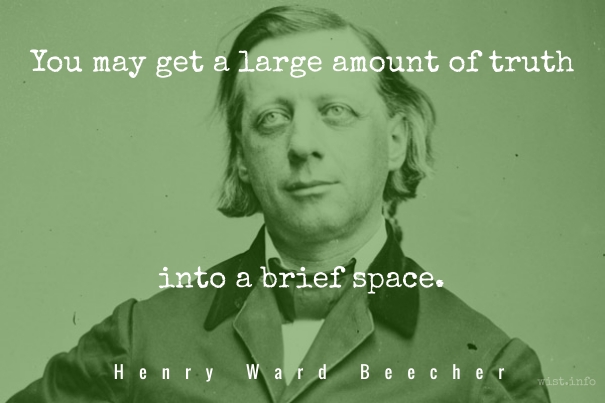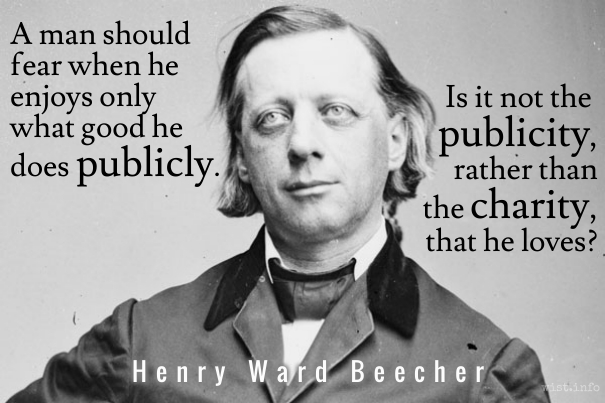Neither should one live in the past, as if to him there was no future; as if he had done with all the rest of life. Keep young. Many men talk about being born again. Every man should be born again on the first day of January. Start with a fresh page. Take up one more hole in the buckle, if necessary, or let down one, according to circumstances; but, on the first of January let every man gird himself once more, with his face to the front, and take interest in the things that are and are to be, and not in the things that were and are past.
Quotations by:
Beecher, Henry Ward
Books are not made for furniture, but there is nothing else that so beautifully furnishes a house.
Henry Ward Beecher (1813-1887) American clergyman and orator
“The Duty of Owning Books” (1859), Eyes and Ears (1862)
(Source)
The collection of essays is from articles originally printed in the New York Ledger or Independent. This essay was reprinted in several other newspapers in the spring and summer of 1859.
See Sydney Smith.
There are many persons of combative tendencies, who read for ammunition, and dig out of the Bible iron for balls. They read, and they find nitre and charcoal and sulphur for powder. They read, and they find cannon. They read, and they make portholes and embrasures. And if a man does not believe as they do, they look upon him as an enemy, and let fly the Bible at him to demolish him. So men turn the word of God into a vast arsenal, filled with all manner of weapons, offensive and defensive.
If you attempt to beat a man down and to get his goods for less than a fair price, you are attempting to commit burglary, as much as though you broke into his shop to take the things without paying for them. There is cheating on both sides of the counter and generally less behind it than before it.
The cynic is one who never sees a good quality in a man and never fails to see a bad one. He is the human owl, vigilant in darkness and blind to light, mousing for vermin, and never seeing noble game. The cynic puts all human actions into two classes — openly bad and secretly bad.
No man can tell whether he is rich or poor by turning to his ledger. It is the heart that makes a man rich. He is rich or poor according to what he is, not according to what he has.
A noble man compares and estimates himself by an idea which is higher than himself; and a mean man by one which is lower than himself. The one produces aspiration; the other, ambition. Ambition is the way in which a vulgar man aspires.
Henry Ward Beecher (1813-1887) American clergyman and orator
Life Thoughts (1858)
(Source)
Sometimes misattributed to Marcus Aurelius.
The way to avoid evil is not by maiming our passions, but by compelling them to yield their vigor to our moral nature. Thus they become, as in the ancient fable, the harnessed steeds which bear the chariot of the sun.
Truths are first clouds, then rain, then harvests and food. The philosophy of one century is the common sense of the next. Men are called fools, in one age, for not knowing what they were called fools for averring in the age before.
A conservative young man has wound up his life before it was unreeled. We expect old men to be conservative, but when a nation’s young men are conservatives, its funeral bell is already rung.
Henry Ward Beecher (1813-1887) American clergyman and orator
Life Thoughts (1858) [ed. Proctor]
(Source)
This was more succinctly summarized in Proverbs from Plymouth Pulpit, "Political" (1887) [ed. William Drysdale]:
When a nation’s young men are conservatives, its funeral bell is already rung.
Do the best you can where you are; and, when that is accomplished, God will open a door for you, and a voice will call, “Come up hither into a higher sphere.”
Henry Ward Beecher (1813-1887) American clergyman and orator
Life Thoughts [ed. E. Proctor] (1858)
(Source)
Well-married, a man is winged — ill-matched, he is shackled.
Henry Ward Beecher (1813-1887) American clergyman and orator
Norwood; or, Village Life in New England, Vol. 1, ch. 6 (1867)
(Source)
Later requoted in Proverbs from Plymouth Pulpit, ch. 17 "The Family" (1887).
To array a man’s will against his sickness is the supreme art of medicine.
Henry Ward Beecher (1813-1887) American clergyman and orator
Norwood; or, Village Life in New England, Vol. 1, ch. 6 (1867)
(Source)
The cynic is one who never sees a good quality in a man, and never fails to see a bad one. He is the human owl, vigilant in darkness, and blind to light, mousing for vermin, and never seeing noble game.
A babe is nothing but a bundle of possibilities.
Henry Ward Beecher (1813-1887) American clergyman and orator
Proverbs from Plymouth Pulpit, “Children” (1887) [ed. William Drysdale]
(Source)
A man who cannot get angry is like a stream that cannot overflow, that is always turbid. Sometimes indignation is as good as a thunder-storm in summer, clearing and cooling the air.
Henry Ward Beecher (1813-1887) American clergyman and orator
Proverbs from Plymouth Pulpit, “Man” (1887)
(Source)
A book is a garden; a book is an orchard; a book is a storehouse; a book is a party. It is company by the way; it is a counselor; it is a multitude of counselors.
Henry Ward Beecher (1813-1887) American clergyman and orator
Proverbs From Plymouth Pulpit, “The Press” (1887) [ed. Drysdale]
(Source)
Mirth is God’s medicine. Everybody ought to bathe in it. Grim care, moroseness, anxiety — all this rust of life ought to be scoured off by the oil of mirth. It is better than emery. Every man ought to rub himself with it.
A man without mirth is like a waggon without springs, in which one is caused disagreeably to jolt by every pebble over which it runs. A man with mirth is like a chariot with springs, in which one can ride over the roughest road, and scarcely feel anything but a pleasant rocking motion.
Henry Ward Beecher (1813-1887) American clergyman and orator
Royal Truths (1862)
(Source)
Frequently rendered, but unsourced in this form:
A person without a sense of humor is like a wagon without springs. It's jolted by every pebble on the road.
In Proverbs from Plymouth Pulpit, "The Human Mind" [ed. Drysdale (1887)], Beecher is recorded similarly saying:
A practical, matter-of-fact man is like a wagon without springs: every single pebble on the road jolts him; but a man with imagination has springs that break the jar and jolt.
A man should fear when he enjoys only what good he does publicly. Is it not the publicity, rather than the charity, that he loves?
Henry Ward Beecher (1813-1887) American clergyman and orator
In Henry Ward Beecher and Edna Dean Proctor, Life Thoughts: Gathered From the Extemporaneous Discourses of Henry Ward Beecher (1858)
See Matthew.




